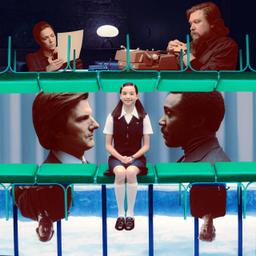Oh, how the mighty have fallen. Not so long ago, Seth Milchick—Seth? Really?—was living it up as the no. 2 on Lumon Industries’ severed floor, rewarding his stalwart macrodata refinement team with music dance experiences and waffle parties as they cheerfully plugged away at identifying scary numbers. Sure, there was that hiccup at the end of Season 1 when the MDR team managed to briefly release their innies to the outside world and, yes, OK, that other time when the next in line to run Lumon nearly died by extension cord under Milchick’s watch. But Kier understands! And in his (His?) beneficence, Milchick started off Season 2 of Severance with a promotion to run the entire floor himself.
From there, though, things have not gone well. Last week’s episode, “Trojan’s Horse,” saw Milchick, played by an exquisitely crackling Tramell Tillman, join everyone’s favorite aspiring Reacher villain, Drummond, for his monthly (!) performance review, which Drummond specifies will last between two and six hours, “depending on the number of atonements and approbations required.” (This means that Milchick is expected to spend as much as 3.75 percent of his monthly working hours in performance reviews. Surely DOGE can do something about this.)
Probably no interview that immediately begins with urinalysis results will be particularly positive. (Looking at you, Chip Kelly.) And indeed, Milchick is browbeaten within a pencil shaving of a PIP. He uses too many big words. He attaches paper clips back to front. Worst of all, he’s offered MDR “kindness reforms”—hall passes to seek goats and intra-office crushes as desired, that calamitous ORTBO, and, yes, letting Mark S. bring back his original Season 1 colleagues to replace the interlopers who turned up at the start of Season 2. Yet MDR has remained Lumon’s squeaky wheel, with Irving nearly drowning Helena Eagan (posing as her innie) and then being sent to a farm upst—er, on an elongated cruise voyage, with his days of refining irrevocably behind him. Milchick is handed a sleek, sans-serif folio recounting his many purported failures, down to a word cloud of his excessively large words. (“Calamitous ORTBO” is, as it happens, a direct quote.)
It’s not all bad. “Despite his many and profound failings,” the folio notes, “a man of such vigor as Mr. Milchick makes for an excellent ballast on which the employees can anchor their days.” But the message is clear—Milchick is on thin ice.
So: Is Milchick actually bad at his job?
The big words—well, fine, Lumon’s got him there. (“Well, perchance I may colloquially employ a—” he begins as a defense before Drummond cuts him off.) The paper clips thing is preposterous but also not anywhere near the strangest Lumon demand and furthermore absolutely the sort of thing I can see Louis firing an associate for on Suits.
Most of the complaints about Milchick’s work seem to have come from Ms. Huang. Nominally his assistant, she seems to instead view herself as a watchdog, constantly criticizing Milchick’s decisions and apparently reporting the ones she disagrees with up the chain. Also, she is a literal child. (The actor who plays her, Sarah Bock, is 18, but still.) Far from helping him, Milchick’s right-hand, uh, girl is basically Lumon’s in-house gestapo. Did Ms. Huang assign herself the thought-police side hustle? Maybe—we never saw Milchick ratting on Ms. Cobel when she was in charge. Given how eager Drummond et al. were to investigate what was likely her complaint about the kindness reforms and MDR’s continued feistiness, it seems likelier that Lumon directed her to monitor the just-promoted Milchick. Call me a rube, but I suspect that the Lumon youth is not great for workplace morale.
There’s also the matter of what Milchick is actually supposed to do as MDR’s manager. Sure, it’s one thing to get the worker bees to meet their quotas. But, in the wake of the Season 1 innie breakout, he’s now contending with four people suddenly wrestling with immense questions of personhood and freedom—subjects that would distract anyone at their day job, even if said job wasn’t located in a fluorescent corporate hellscape.
That’s all before even considering the most egregious imposition of his work: Helly R. At some point prior to Season 1, Helena Eagan—presumably with the approval and endorsement of her father, the current Lumon head, and the shadowy Lumon board—decided to undergo severance and spend some time working on the severed floor, explicitly as a PR stunt to evangelize about the procedure’s safety and efficacy. That is, the boss of Milchick’s boss’s boss’s untold string of bosses decided that Milchick would be personally in charge of shepherding Lumon’s single most high-profile employee while shielding her true identity and making sure the stunt worked as the higher-ups desired. And voilà: Helly R. woke up on the severed floor conference room table with Mark S. welcoming her to her new life as a severed worker.
Just about every problem that has surfaced with MDR has been the direct result of Helly joining the team. Before she did, Mark, Irving, and Dylan were an apparently effective unit. It was Helly’s refusal to accept her life as a severed employee—and Helena’s refusal to back down from the gambit and let Helly “quit”—that sent the team off on their voyage into consciousness. (Yes, Petey resurfacing in Mark’s outie life after trying to reverse his own severance procedure would still have happened, but Helly and her discontents poured fuel on the fire.) None of this is Milchick’s fault! Imagine being informed that your mysterious boss with untold wealth and power is personally assigning their child to you to guide in secrecy through work, a mission whose success will be exactingly monitored and will make or break your career. No thank you! Then imagine that that child turns out to be a middle manager’s greatest fear: a lousy worker who distracts her otherwise hardworking colleagues and sows so much discord that it threatens the workplace’s very existence.
What is Milchick supposed to do with that hand? He can’t say no. He can’t complain. Through Season 2, we saw Helena accept the reality that the Helly experiment had run its course, only for Mark to demand that she return and for the board to approve it. Most recently, after Irving figured out that Helena was pretending to be Helly, Helena ordered Milchick (in front of the rest of the MDR team, no less) to switch her back into Helly mode, and now Helly is back on the severed floor every day. Everyone knows there’s nothing good that can come of it. Milchick knows. Helena knows. But the Lumon muckety-mucks have decided that Helly will stay, so it’s Milchick’s unsolvable problem to deal with.
So much of the fun of Severance’s first season was in watching Tillman vamp, all mustache and grin and turtleneck. (It’s no coincidence that Tillman SZN is imminent—he landed a role in the next Mission: Impossible when writer and director Christopher McQuarrie saw him in all his Milchick glory and reached out.) Indeed, Milchick mostly seemed to enjoy his job. Now, though? While it’s clear that he wanted this season’s promotion and enjoyed the comeuppance of Ms. Cobel, he seems more miserable with every passing episode. How could he not be? He’s followed around all day by an antagonistic JV tattletale. He got those very weird Black Kier paintings, ostensibly as a reward. His actual work assignment is basically impossible. His higher-ups are petty and malicious.
Milchick, honey—you’ve got another performance review in just a few weeks. You can always quit.




